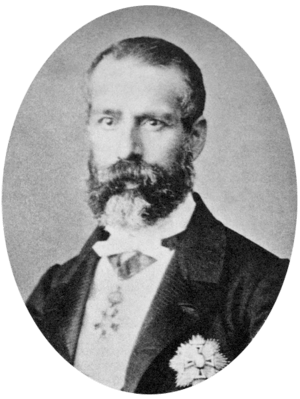Leonardo Márquez facts for kids
Quick facts for kids
Leonardo Márquez
|
|
|---|---|
 |
|
| Governor of Jalisco | |
| Assumed office January 8, 1859á |
|
| Succeeded by | Luis Tapia |
| In office May 15, 1859 – May 28, 1859 |
|
| Preceded by | Luis Tapia |
| Succeeded by | Luis Tapia |
| In office September 3, 1859 – November 14, 1859 |
|
| Preceded by | Luis Tapia |
| Succeeded by | Luis Tapia |
| Personal details | |
| Born | January 8, 1820 Mexico City |
| Died | June 5, 1913 (aged 93) Havana, Cuba |
| Political party | Conservative |
| Awards | |
Leonardo Márquez Araujo (born January 8, 1820 – died July 5, 1913) was a Mexican general who believed in conservative ideas. He fought against the Liberals, a group led by Benito Juárez. After losing the Reform War, he had to use guerrilla tactics. Later, he worked with the French during their time in Mexico to support the conservative side. But when the French were defeated, he had to live in exile for most of his life.
Contents
General Leonardo Márquez's Career
Early Military Service
Leonardo Márquez fought against the United States in the Mexican–American War. This war took place from 1846 to 1848. He was a strong supporter of the conservative General Antonio López de Santa Anna. Márquez joined Santa Anna's revolutionary movement in 1849.
The Reform War
After Santa Anna's government fell in 1855, Liberals came to power. Márquez then supported the conservative government. He fought against the liberal government of Benito Juárez in the Reform War (1858-1860).
- Márquez and Miguel Miramón, another leading conservative general, had early successes.
- However, the situation changed in 1860, and the Liberals won many battles.
- Márquez became known as "The Tiger of Tacubaya". This name came from the Battle of Tacubaya on April 11, 1859.
- After the conservatives lost on the battlefield, Márquez continued fighting. He used guerrilla warfare in the Sierra Gorda mountains.
- He is linked to the deaths of important liberal figures. These included Melchor Ocampo and General Leandro Valle.
French Intervention in Mexico
In 1862, Márquez supported the idea of inviting Maximilian Hapsburg to become the emperor of Mexico. This would create the Second Mexican Empire. Even though he didn't plan this, he joined the French forces. He fought under General Charles de Lorencez during the first invasion.
- In 1864, Márquez was sent on a mission to Constantinople.
- Meanwhile, in Mexico, the war was changing. Liberals began winning back their land.
- The French emperor started to think about the pros and cons of the war.
Later Years and Exile
In October 1866, Maximilian made Márquez a division commander. He led forces around Mexico City. However, Márquez was causing problems by forcing people to join the army. He also demanded money from people living in the capital. French general Bazaine did not approve of Márquez's methods.
- In March 1867, Maximilian sent Márquez to Mexico City. His job was to form a government and gather troops. These troops were meant to help the city of Querétaro.
- Márquez and Miguel Miramón were rivals and often disagreed.
- Miramón had suggested attacking the republican army when they were divided. Márquez opposed this idea.
- Márquez joined Maximilian at Querétaro. He tried to break through the enemy lines.
- He was defeated before reaching the city. He then returned to Mexico City.
- There, he was surrounded by the liberal General Porfirio Díaz.
- Márquez tried to organize a force to help the Emperor. When this seemed impossible, he planned to create his own government. He wanted to set it up in the southern states, with Puebla as its capital. He hoped to continue the conservative cause.
However, it was too late. The emperor was captured on June 21, 1867. Márquez hid for several months. He then went to Vera Cruz and later to Havana, Cuba. Maximilian and loyal conservative generals Miguel Miramón and Tomás Mejía were executed.
- Márquez was specifically excluded from Juárez's amnesty in 1870. This meant he was not forgiven.
- He was allowed to return to Mexico in 1895.
- But he went back to Cuba in 1901 because he was still unpopular.
- He continued to defend his actions during the Empire.
- He lived long enough to see the start of the Mexican Revolution. He also saw the fall of Porfirio Díaz, who had defeated the Empire forty years earlier.
- Márquez died in 1913 at the age of 93.
See also
 In Spanish: Leonardo Márquez para niños
In Spanish: Leonardo Márquez para niños

